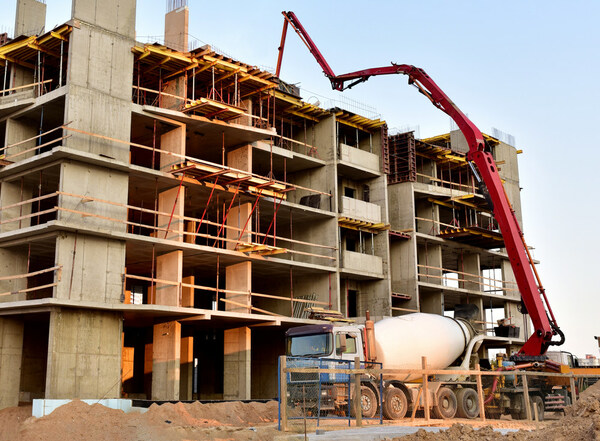
Addition of CO2 as a diluted gas from industrial waste sources or the air would turn C-Crete’s concrete into a carbon-negative building material
SAN LEANDRO, Calif., Oct. 2, 2023 /PRNewswire/ — C-Crete Technologies is developing a method for using carbon dioxide captured at industrial sources or from the air as an ingredient in its cement-free concrete, in work accelerated by $2 million in funding from the US Department of Energy.
The DOE funding will help propel C-Crete’s already eco-friendly product into the exceptional category of carbon-negative building materials, possibly the first pourable, ready-mix concrete product to achieve this longtime goal of the industry.
The CO2 incorporated into the product – whether captured from the air as the concrete cures or from industrial point sources – could be used in a diluted form, eliminating the costly step of separating it from other gases. Once mineralized in the concrete, the diluted CO2 would make the new material stronger, tougher and more durable than conventional concrete.

At the core of C-Crete’s innovation lies its patented high-performance, cement-free binder technology that uses different local materials as feedstocks. C-Crete’s binder produces almost no CO2 in its manufacturing and continues to absorb it from the air over time. Its scalability and cost-parity with conventional cement make it a viable alternative to ordinary Portland cement – a notorious contributor to global CO2 emissions.
The DOE’s support for C-Crete’s work underscores the profound impact that innovative approaches can have in the battle against carbon emissions.
“We are committed to crafting a cement-free, ready-mix, carbon-negative concrete that doesn’t just mitigate carbon emissions but actively contributes to reversing climate change,” says Rouzbeh Savary, Ph.D., founder and president of C-Crete Technologies. “Our aim is nothing short of revolutionizing this hard-to-abate, carbon-heavy sector of the construction industry.”
“Concrete is one of the most difficult materials to address within the construction industry because the way it is used often precludes other sustainable strategies such as re-use and effective recycling,” says Stuart Macalister, technical design lead at Heatherwick Studio, an international award-winning architecture firm based in London. “C-Crete are pioneering significant reductions in the embodied carbon of concrete and their continued research into alternative techniques to avoid over dependence upon a single material source, is both savvy and inspiring.
“C-Crete’s sequestration of CO2 into cast-in-place concrete is another aspect with huge potential. The consensus amongst climate scientists is that even if we do everything else right to reduce emissions, the world still needs to remove gigantic amounts of CO2 from the atmosphere. Direct-air capture of CO2 is very expensive currently, so other methods, such as those being developed by C-Crete, are vitally important,” says Macalister.
“We need to do testing to get the use of next-generation materials like C-Crete’s right, and that requires early adopter field trials,” says Donald Davies, a developer and structural engineer with 33 years in the business, whose building in Seattle was the site of C-Crete’s first commercial pour. “It’s exciting to be a part of helping C-Crete on this important next step forward.” Davies is also chair of Building Transparency, a nonprofit dedicated to enabling the building industry to address embodied carbon’s role in climate change.
About: C-Crete Technologies is a leading materials science company committed to inventing, building and scaling up the next generation of infrastructure materials with ultra-low or negative CO2 footprints. With a relentless focus on environmental stewardship and technological innovation, C-Crete aims to address the global challenges of climate change while delivering superior infrastructure materials at scale.
By Denise Brehm
Media Contact:
617-872-6507
info@ccretetech.com